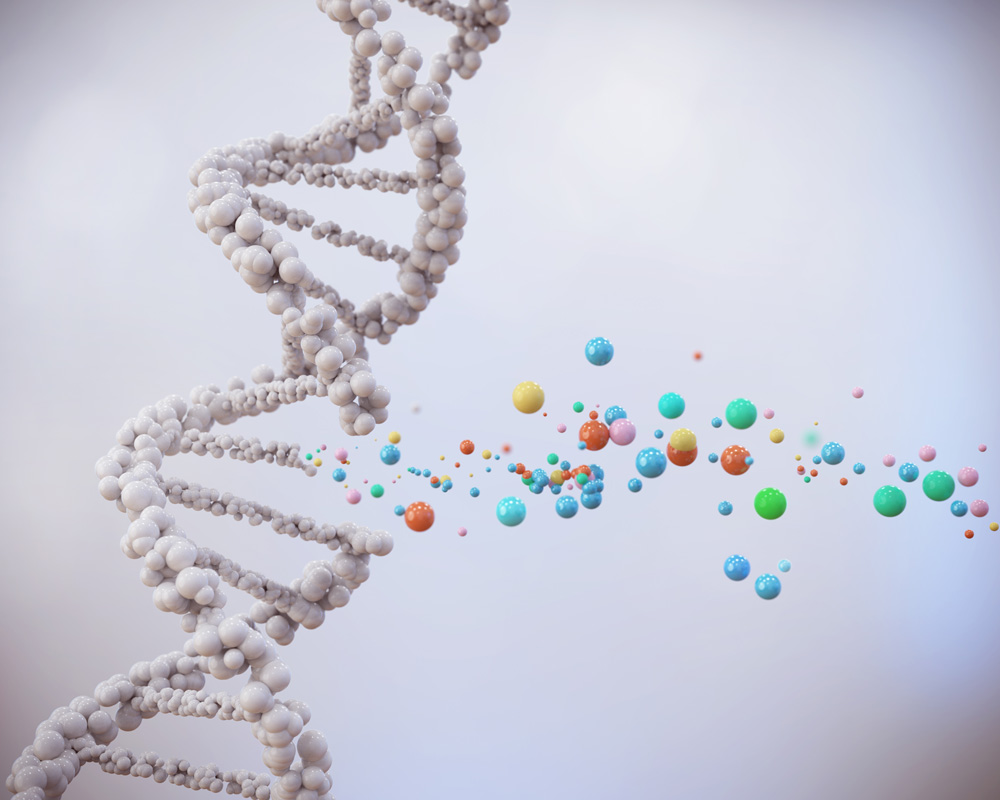Genetic Prevalence
Understanding the Genetics of Congenital Sucrase-Isomaltase Deficiency
All individuals inherit two copies of most genes in their DNA. You inherit one set of genes from your mother (maternal genes) and one set from your father (paternal genes). Each gene is a code or set of instructions that your body’s cells follow to make proteins, including enzymes. These proteins and enzymes determine how your cells and tissues grow, develop, and function.
In This Section
Sometimes a gene’s code is altered. Genes that have been altered are called variants. Most human genes contain many naturally-occurring gene variants.
A gene variant may alter how a cell makes the protein or enzyme that is coded by that particular gene. Most gene variants are benign, which means they do not cause an alteration in the function of the protein or enzyme. Sometimes, the gene variant results in an altered protein or enzyme that doesn’t function normally. These variants are considered pathogenic when the dysfunctional protein causes a disease.
Congenital Sucrase-Isomaltase Deficiency (CSID) is an inherited disorder caused by a variation in the gene that codes for the enzyme sucrase-isomaltase. This means that in individuals who are affected by CSID, the gene that codes for the sucrase-isomaltase enzyme is altered in such a way that the individual’s cells are unable to produce functional sucrase-isomaltase.

One may inherit one copy of a gene variant from one parent, or two copies of a gene variant, one from each parent. Most genetic disorders result from a recessive pattern of inheritance, which means there are two variant genes (one from each parent).
While the symptoms of a genetic disorder are usually strongest when two copies of the gene variant are inherited (recessive), symptoms of CSID may also be present in those who have inherited only one copy of a gene variant that alters the function of the sucrase-isomaltase enzyme.
The sucrase-isomaltase gene (SI) is a very large gene, made up of more than 100,000 base pairs of DNA. As a result, there are many possible variants of the gene that codes for the enzyme sucrase-isomaltase. Most of these SI variants are benign, which means they do not impair the enzyme’s function. However, in a number of studies of individuals diagnosed with CSID, researchers have identified 37 gene variants that code for an impaired form of the enzyme sucrase-isomaltase, causing CSID.1-9 Among these 37 known gene variants, four gene variants were the most common variants identified.9
As the name implies, sucrase-isomaltase is a complex enzyme containing two parts or subunits, sucrase and isomaltase. A genetic variant affecting either the sucrase or isomaltase region of the enzyme may affect the cell’s ability to produce the enzyme or the enzymatic activity of either sucrase or isomaltase, or both.10
Researchers have not yet studied all the gene variants that cause CSID. For this reason, there may be individuals who have had CSID symptoms from when they first ate solid food or early childhood who do not have one of the gene variants currently known to be associated with CSID.
The Estimated Prevalence of CSID in Various Populations
In past clinical studies, the prevalence of a CSID diagnosis, based on results from disaccharidase assays of intestinal tissue samples, was found to be relatively high in certain demographic groups:11
- 2% to 10% in Greenland Eskimos
- 3% to 7% in Canadian natives
- 3% in Alaskans of native ancestry
The prevalence of CSID in other North American and European populations has been estimated to be lower than in these groups, approximately 1 in 500 to 1 in 2,000 among non-Hispanic whites. This translates to a prevalence of approximately 0.05% to 0.2%. The prevalence is thought to be even lower in African-Americans and whites of Hispanic descent.12
It is possible that a significant proportion of children and adults affected with CSID are not being tested for CSID, and therefore are not being properly diagnosed or adequately treated. Because the gastrointestinal (GI) symptoms associated with CSID are similar to many other GI disorders, such as irritable bowel syndrome (IBS) or toddler’s diarrhea, some researchers believe that many of those who are diagnosed with IBS may actually have undiagnosed CSID.
References
- Alfalah M, Keiser M, Leeb T, et al. Compound heterozygous mutations affect protein folding and function in patients with congenital sucrase-isomaltase deficiency. Gastroenterology. 2009;136(3):883-92. doi:10.1053/j.gastro.2008.11.038
- Gericke B, Amiri M, Naim HY. The multiple roles of sucrase-isomaltase in the intestinal physiology. Mol Cell Pediatr. 2016;3(1):2. doi: 10.1186/s40348-016-0033-y
- Jacob R, Zimmer KP, Schmitz J, et al. Congenital sucrase-isomaltase deficiency arising from cleavage and secretion of a mutant form of the enzyme. J Clin Invest. 2000;106(2):281-7. doi:10.1172/JCI9677
- Keiser M, Alfalah M, Pröpsting MJ, et al. Altered folding, turnover, and polarized sorting act in concert to define a novel pathomechanism of congenital sucrase-isomaltase deficiency. J Biol Chem. 2006;281(20):14393-9. doi:10.1074/jbc.M513631200
- Naim HY, Heine M, Zimmer KP. Congenital sucrase-isomaltase deficiency: heterogeneity of inheritance, trafficking, and function of an intestinal enzyme complex. J Pediatr Gastroenterol Nutr. 2012;55(suppl 2):S13-20. doi: 10.1097/01.mpg.0000421402.57633.4b
- Ritz V, Alfalah M, Zimmer KP, et al. Congenital sucrase-isomaltase deficiency because of an accumulation of the mutant enzyme in the endoplasmic reticulum. Gastroenterology. 2003;125(6):1678-85. doi:10.1053/j.gastro.2003.09.022
- Sander P, Alfalah M, Keiser M, et al. Novel mutations in the human sucrase-isomaltase gene (SI) that cause congenital carbohydrate malabsorption. Human Mutat. 2006;27(1):119. doi: 10.1002/humu.9392
- Spodsberg N, Jacob R, Alfalah M, et al. Molecular basis of aberrant apical protein transport in an intestinal enzyme disorder. J Biol Chem. 2001;276(26):23506-10. doi:10.1074/jbc.C100219200
- Uhrich S, Wu Z, Huang J, Scott CR. Four mutations in the SI gene are responsible for the majority of clinical symptoms of CSID. J Pediatr Gastroenterol Nutr. 2012; 55(2):S34-5. doi:10.1097/01.mpg.0000421408.65257.b5
- Naim HY, Roth J, Sterchi EE, et al. Sucrase-isomaltase deficiency in humans. Different mutations disrupt intracellular transport, processing, and function of an intestinal brush border enzyme. J Clin Invest. 1988;82(2):667-679. doi:10.1172/JCI113646
- Treem WR. Congenital sucrase-isomaltase deficiency. J Pediatr Gastroenterol Nutr. 1995;21(1):1-14. doi:10.1097/00005176-199507000-00001
- Treem WR. Clinical aspects and treatment congenital sucrase-isomaltase deficiency. J Pediatr Gastroenterol Nutr. 2012;55(suppl 2):S7-S13. doi:10.1097/01.mpg.0000421401.57633.9




